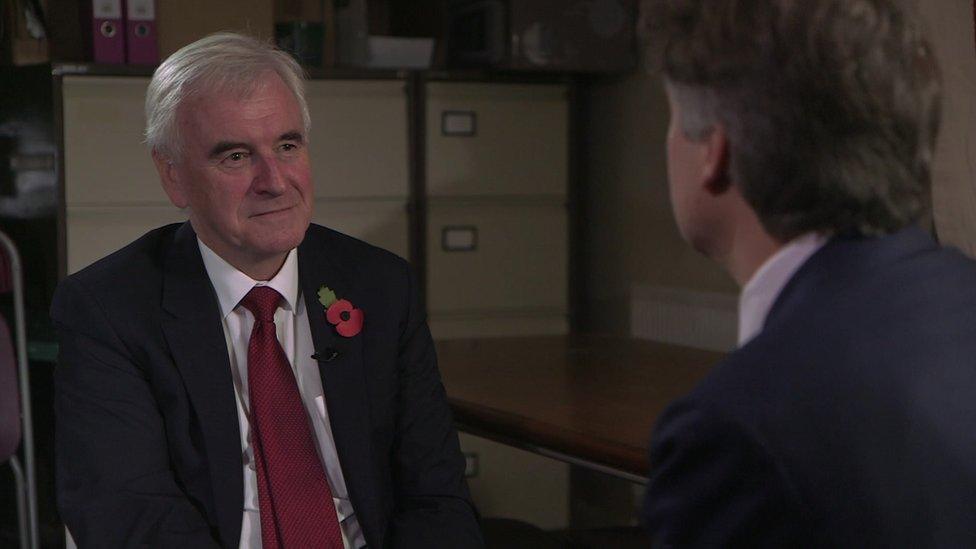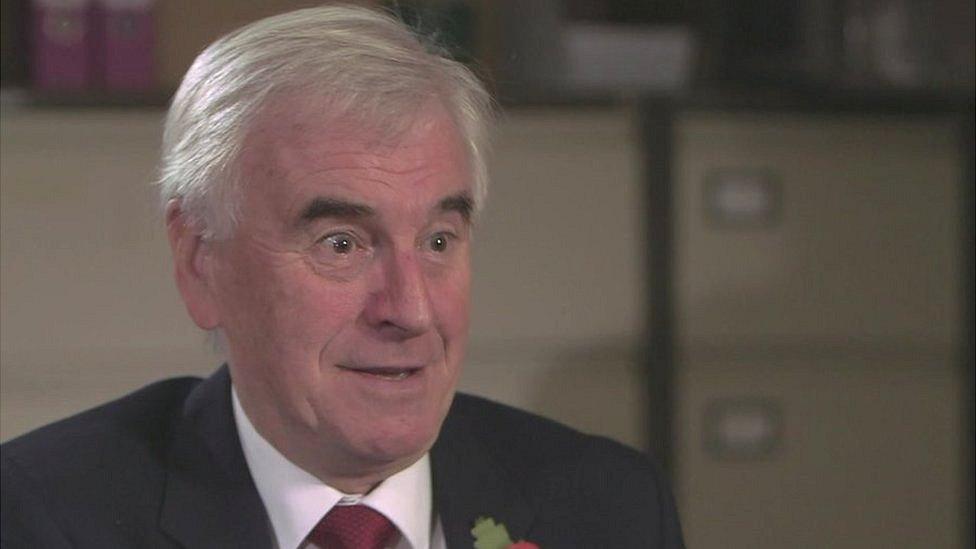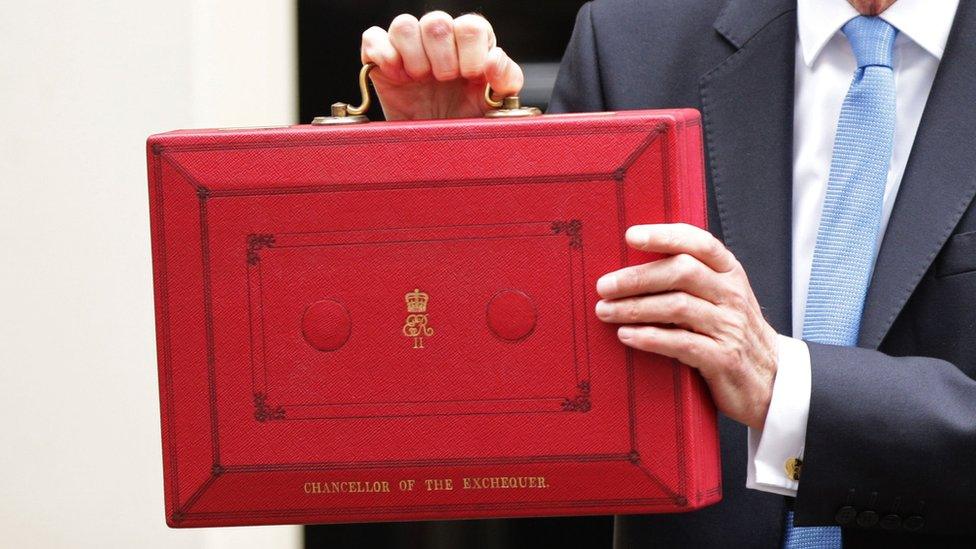Budget 2018: McDonnell guided by memories of '92 defeat
- Published

John McDonnell is one of those confident political beasts who rarely acknowledge moments of vulnerability.
But the shadow chancellor admits that he has experienced a bruising few weeks. And that's not just because he sustained a bloody nose after tripping on rubbish outside his home.
In an interview with Newsnight, Mr McDonnell admits that the last week has been politically painful after centrist Labour MPs rebelled against his decision to accept Tory tax cuts in the budget.
"Oh yeah, oh no doubt about it," he told me when I said he had endured a painful time after last week's budget.
Mr McDonnell spoke of the internal Labour row during an interview in which he denied having fallen out with Jeremy Corbyn but acknowledged they complement each other with different personal qualities.
The shadow chancellor also spoke of how he had been seared by the 1992 general election when Labour failed to overcome Tory charges that it would increase taxes for middle income earners.
Bank manager or revolutionary Trot?
Mr McDonnell had a ready answer to a jibe coined by the veteran Labour MP Margaret Hodge: that he is a Jekyll and Hyde character who veers between acting as a sensible bank manager and a revolutionary Trot.
Asked which depiction was true: "I am all of those things. I am a radical socialist. There is no doubt about that. That is my history. Everything I advocate is about transforming society, creating a more equal and more democratic and fairer society.
"I argue that it has got to be a prosperous society. But the difference between us and the Tories is that we want that prosperity shared by everybody. I call that socialism. At the same time I have been saying to people if we are going to win power, go into government, implement these policies, everything we do we have got to frame as common sense."
His role as the cautious bank manager, rather than a revolutionary Trot, explains his run-in last week with a group of twenty Labour MPs, led by Yvette Cooper, most of whom would normally be seen sitting to the right of his Socialist Campaign Group.
They took exception to Mr McDonnell's plan to accept Tory plans to bring forward a manifesto pledge to raise the personal tax allowance and the higher rate threshold on the grounds that this would benefit the top 20% of society.
The shadow chancellor refused to back down because he saw a trap in the budget. Had he rejected the tax cuts the Tories would have claimed Labour would increase taxes on middle income earners.
"When you see your opponent digging a hole in front of you, putting the spikes into that hole, covering them with leaves and inviting you to step into it, sometimes you want to walk round it."
It is Mr McDonnell's memory of the 1992 general election, when he failed to win his Hayed and Harlington seat by 53 votes, which explains his tactics.
Perhaps surprisingly for the leading figure of the hard left in Parliament over the last 20 years, Mr McDonnell is focused strongly on not upsetting Middle England. Only the top 5% of earners on incomes over £80,000 a year will be in his sights.
"The experience of '92 is seared into me," he told me in his constituency office, which is festooned with political banners and posters.
"This is a working class multicultural community. I have lived here nearly 40 years.
"In '92 I went round knocking on doors. If you remember the campaign the Tories waged with the big posters - Labour tax bombshell. I was knocking on doors of people who were unemployed, who were on low wages as well, saying to me 'I can't vote for you because you will increase my taxes'. And we hadn't won the argument about a fair taxation system.
"So of course I am not going to make that mistake again. We are trying to persuade the Labour party we should never let them traduce our policies in that way. We have to be absolutely clear about our direction."
Corbyn has 'different virtues'
Mr McDonnell insists that he and Jeremy Corbyn have never had a political difference despite reports that the Labour leader had sympathised with the centrist Labour MPs on the Tory tax cuts. But he admits that they have different qualities.
Asked whether they are different, with Mr McDonnell as the hard-headed strategist and Mr Corbyn as the dreamer, the shadow chancellor said: "This idea that Jeremy is a dreamer is absolutely rubbish. Look at the work he has done on detailed policy. He had led on housing for years, well in advance of anyone else. He is a specialist in international affairs, always has been.
"Jeremy has got a steel about him that people out there will see increasingly. But you are right. We complement one another all the time. In some ways we have different virtues and different strengths and different weaknesses. And we work with each other in that way."
Mr McDonnell insists that Mr Corbyn is deadly serious about serving as prime minister even though he agreed to stand as the Socialist Campaign Group candidate in the 2015 Labour leadership contest with the words: "Oh go on then I'll do it."
The shadow chancellor said: "That is the sort of leader I want. I don't want someone who comes into Parliament with that back of an envelope: MP at such an age, minister at such an age, prime minister at such an age. I want someone who isn't motivated by career but by principle."
- Published5 November 2018

- Published5 November 2018

- Published29 October 2018
